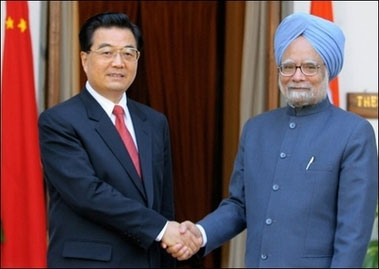Sino-India partnership 'of global significance'
By Li Xing (China Daily)Updated: 2006-11-22 07:50
 Chinese President Hu Jintao (L) shakes hands with Indian Prime Minister Manmohan Singh prior to a delegation level meeting in New Delhi. [AFP]  |
The talks between the leaders of the two most populous countries resulted in a joint declaration that promises, among others, to double the volume of trade to US$40 billion by 2010, seek an early settlement of outstanding issues such as the "boundary question" and boost co-operation in science and technology including expansion of the civilian nuclear energy programme.
Trade has risen from $260 million in 1990 to $18.7 billion in 2005, Sun Yuxi, China's ambassador to India said in a release issued in local newspapers in New Delhi today. It has reached $13.6 billion in the first seven months of this year and is expected to surpass $20 billion by the year end, he said.
The two sides also pledged to hold regular summit-level meetings, strengthen institutional contacts and dialogue, promote and protect bilateral investment and expand co-operation in trade, industry, finance, agriculture, water resources, energy, environment, information technology, tourism and other fields.
They have instructed a joint task force to complete a feasibility study on a Sino-Indian regional trading arrangement by October 2007.
The two countries also decided to exchange views more frequently on "the emerging security environment in the Asia-Pacific and in the world," instil mutual trust and confidence through defence co-operation and work closer together to counter terrorism.
During his talks with Singh, Hu put forward six proposals on the development of relations.
He suggested that China and India enhance mutual political trust through dialogue and consultations; achieve win-win results by strengthening economic and trade collaboration; broaden common interests by expanding co-operative projects; augment the foundation of friendship by increasing people-to-people exchanges; and maintain peace on the border areas.
After the talks, the two sides signed 13 agreements, protocols or MOUs.
"In bilateral, regional and international dimensions, China and India share broad common interests," Hu told more than 200 journalists representing dozens of Chinese, India and other international media.
He stressed that both sides have agreed to intensify their work and follow the spirit of the guiding principles for the settlement of the boundary question signed in April last year.
While solutions to the border question are pending, Hu said the two sides would work together to maintain peace and tranquility in the border areas.
"Both China and India are confident of our future relationship and are willing to work together to facilitate all-round and in-depth development of strategic and co-operative partnership," Hu said.
The Indian prime minister said: "As two large Asian states and as two of the fastest growing emerging economies of the world, co-operation between India and China transcends the bilateral and has global significance.
"The nature and range of agreements signed today point to the consolidation and diversification of bilateral relations," Singh said.
"I think both sides have realized that solutions to pending issues are not near concrete," Dr Swaran Singh, associate professor of the School of International Studies at Jawaharlal Nehru University, told China Daily.
"However, both expressed determination that bilateral relations will stay on course and will not allow contentious issues to disrupt their relationship."
India is the third leg of Hu's four-nation tour, which has already taken him to Viet Nam and Laos, and will also take him to Pakistan tomorrow.
| 1 | 2 |  |
|
||
|
||
|
|

